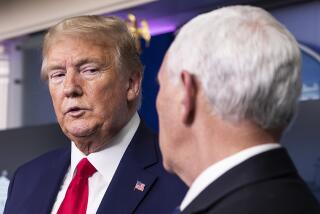LBJ Bugged Phone of His Vice President
- Share via
WASHINGTON — Lyndon B. Johnson was so fearful that Hubert H. Humphrey would break with him over Vietnam in an attempt to win the 1968 election that he had the FBI bug his own vice president, a new biography of LBJ discloses.
Boston University historian Robert Dallek, who has researched the life of the 36th president for the last 14 years, also reveals that Johnson, even though he had withdrawn as a candidate in March, secretly encouraged a “draft Johnson” movement at the Democratic National Convention in Chicago that summer. He may have sought a draft for no other reason than the ego-satisfying opportunity to turn it down, Dallek writes.
Dallek’s book, “Flawed Giant,” to be published by Oxford University Press in April, sheds light on the 1968 election, in which Republican Richard M. Nixon defeated Humphrey by a hair. Nixon’s election led to escalation of the Vietnam War as well as the Watergate scandal and the country’s first presidential resignation.
Johnson had deep misgivings about Humphrey. He “considered him too soft and too much of a bleeding-heart liberal who would have trouble making tough decisions,” Dallek said.
Johnson also believed that Humphrey “would abandon the war the minute he took the oath of office,” leaving it to history to label Johnson the first president to have lost a war, Dallek writes.
“He understood that Humphrey was under great pressure to break with him,” Dallek writes. “To keep close tabs on the inner workings of Humphrey’s campaign, Johnson had the FBI tap Humphrey’s phones. If Humphrey were going to come out against the war, Johnson wanted advance notice and a chance to dissuade him.”
Unenthusiastic about the prospects of either a Humphrey or a Nixon presidency, Johnson, according to Dallek, privately urged Republican Gov. Nelson A. Rockefeller of New York that spring to get into the race--advice Rockefeller took too late.
Because of his distrust of Humphrey, Johnson secretly supported Nixon and sometimes acted to undercut Humphrey--forbidding his aides, for example, from publicly endorsing the vice president.
Earlier, Johnson’s disenchantment with the candidates caused him to reconsider his decision not to seek reelection, especially after Robert F. Kennedy’s slaying in Los Angeles in June.
Johnson laid plans to become the nominee, Dallek writes, and maneuvered to be drafted at the convention.
More to Read
Sign up for Essential California
The most important California stories and recommendations in your inbox every morning.
You may occasionally receive promotional content from the Los Angeles Times.













